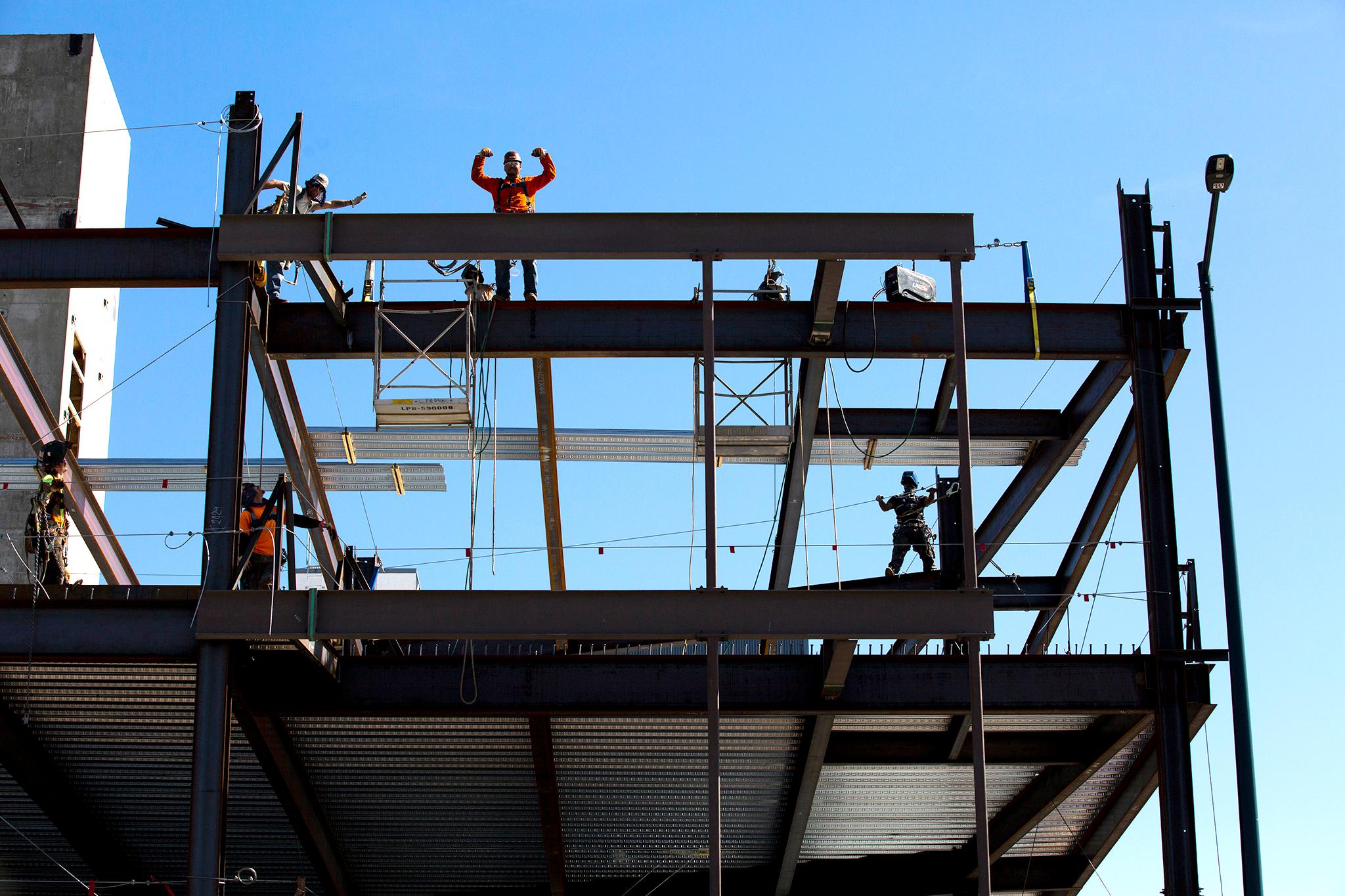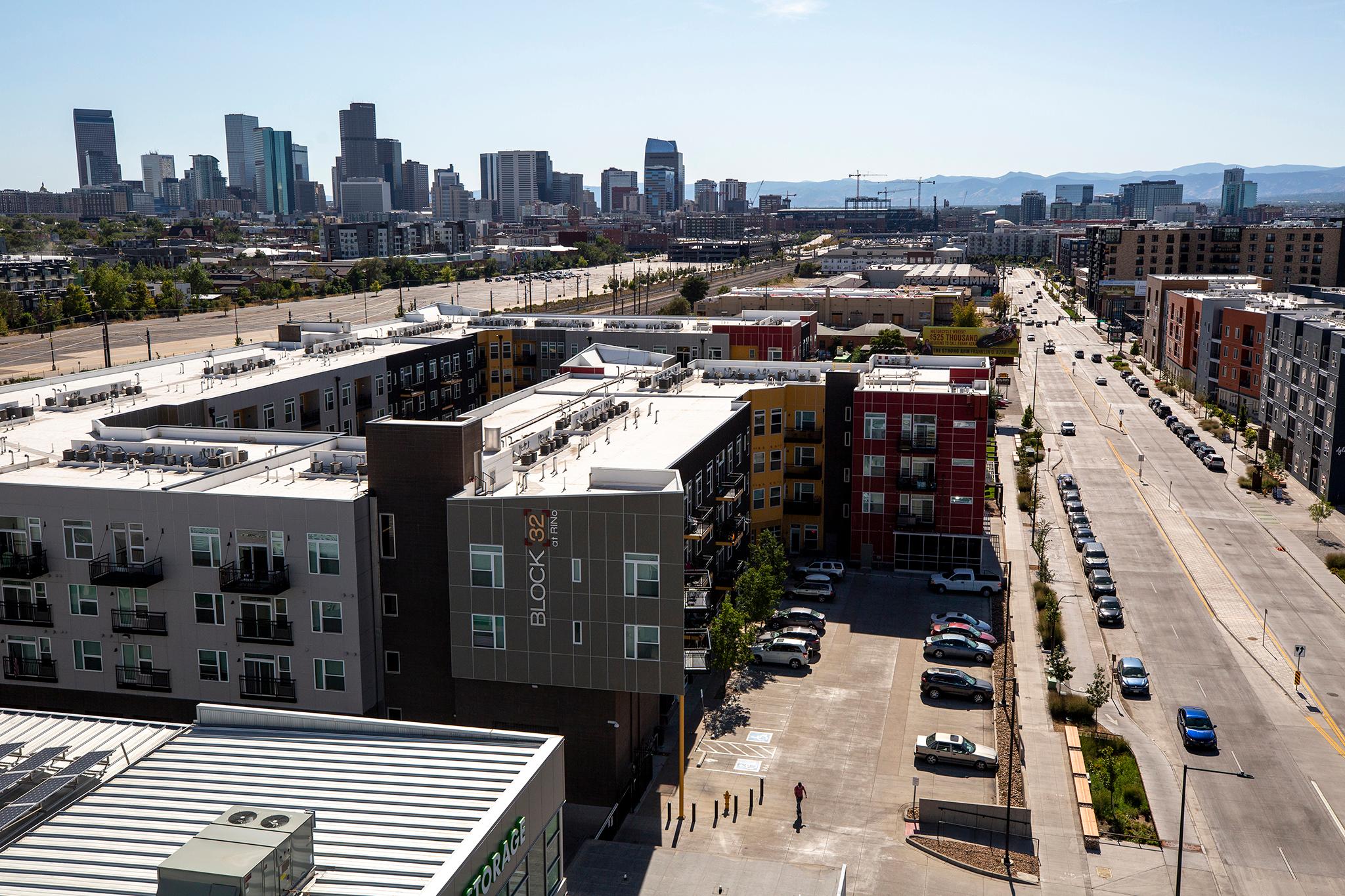At the turn of this century, the Brighton Boulevard area was an industrial and commercial zone with only about 80 homes.
Today, there are more than 350 apartments alone in Post River North, just one of the residential towers with views of the mountains and downtown that have been built along the boulevard in recent years. Like the boom across Denver, Brighton's hasn't meant opportunity for everyone.
For just over $1,500 a month you can get a one-bedroom at the Post, which is in Five Points, along with access to a pool, yoga studio and a 24-hour gym. The nearby Edison at RiNo has fitness classes, electric-car charging stations and $1,500 studios. Dylan apartments start at $1,385 and the building boasts a speakeasy. City Gate has cheaper studios starting at about $1,200, and a guest suite that will come in handy when you're living in 548 square feet. Denargo Market, which pioneered upscale apartment living along Brighton, offers one-bedrooms starting at just over $1,600, an "athletic zone" instead of a gym and a theater.
Among those who would find those rents out of reach are artists who might forego the speakeasy for a place to live with space to create. Artists first gave Brighton cachet by transforming warehouses into homes or studios or both.
Wendy Holmes tried to do something about artists being priced out of the area. Holmes is a senior vice president at Artspace, a national nonprofit that develops housing artists can afford. In 2016, Artspace, several city agencies and donors announced plans to build 90 homes for artists at 40th and Brighton in Elyria-Swansea. Also part of the effort was the RiNo Art District, which has its roots among local artists and connects the neighborhoods of Globeville, Elyria-Swansea, Five Points and Cole with initiatives that use art to spur economic and community development.
"We had designs and everything. Got close. Got really close," Holmes said of efforts in partnership with the private developer Westfield.
Artspace primarily develops housing but also was planning studios on Brighton after surveys of Denver artists focused on that as a need. But the funding couldn't be worked out, Holmes said.
Artspace had begun considering a project in Denver five years before, when Holmes said artists were on "the cusp" of widespread displacement.
"Now there's been a great deal of displacement," she said.
Her organization has projects elsewhere in Colorado and is still working with city officials to bring artist housing to Denver. But probably not in the Brighton area.
"It's just harder there now because property values are so high and corresponding taxes are so high," Holmes said.
Jenny Linne Usaj, managing broker at Usaj Realty and a member of the Denver Metro Area Realtors Market Trends Committee, pulled together data from CoStar, a commercial database, on sales in the area from 2001 to Sept. 1, 2019. Lots on Brighton sold for less than $20 a square foot in 2002 and 2003. This year, the price was about $200.
In 2007, the year Usaj started selling real estate in Denver, you could get a Brighton lot for $30.
Her husband was a firefighter then and his district included the area. Usaj remembers the boulevard as the street where her husband's friends found mechanics to work on their sports cars.
"Land wasn't worth anything ... because why would anyone want to come here?" Usaj said over a tea at The Source. "It was just warehouses."

Usaj now specializes in downtown, where she lives, and downtown-close areas.
"My hope would be that in 10 years there's more affordable housing options. And that more condo buildings are built," Usaj said.
She focuses on sales and notes that most of the housing right on Brighton is for rent, though she is starting to see condos nearby.
"The city is in dire need of housing for regular people," Usaj said. "We don't need more luxury condos. Though they are lovely."
Micro units and prefab architecture could help fill the missing middle along Brighton and elsewhere in Denver, she said, adding "I think this neighborhood would tolerate that kind of creativity."
Chris Pacheco said Denver's communities have traditionally been economically diverse. That is what he wants for the future of the Brighton Boulevard area, to maintain "that unique neighborhood feel, what every neighborhood wants to have."
Pacheco is a deputy director of the North Denver Cornerstone Collaborative, a city agency Mayor Hancock formed in 2013 to coordinate development and ensure long-neglected neighborhoods benefited from change. One of the collaborative's key projects was the Brighton Boulevard Corridor Redevelopment initiative that brought the sidewalks, parks, improved drainage and bike paths that have made an area once dominated by business more welcoming to residents.
The collaborative works with other city entities, including Denver Economic Development & Opportunity. Laura Brudzynski, who directs housing policy and programs for the economic development department, said the city had several tools to help create housing within reach of all -- "artists, teachers, police, people who grew up in the area."
Among the tools, Brudzynski said, are rules under which developers can build taller than would normally be allowed, in exchange for ensuring they include affordable units in their projects or nearby.
The city also can work with partners. Brudzynski pointed to a planned 66-unit complex at 3773 Walnut St., not far from Brighton Boulevard. No Walnut Street Lofts household can earn more than 60 percent of the area median income and seven of the apartments will be set aside for families earning no more than 30 percent AMI. Rents will range from about $400 for a one-bedroom to $1,200 for a three-bedroom.
The Urban Land Conservancy acquired the plot at 3773 Walnut before the neighborhood got trendy. The real estate nonprofit's development partner Medici Consulting Group won nearly $1.2 million in low-income housing tax credits from the Colorado Housing and Finance Authority to finance Walnut Street Lofts. The project, expected to be completed next spring, also received a $600,000 loan and a $150,000 grant from CHFA's Capital Magnet Fund. Denver Economic Development & Opportunity pitched in $1.35 million from the city's Affordable Housing Fund.
"The word is getting out that affordability is our primary concern," said Pacheco of the North Denver Cornerstone Collaborative, adding developers were responding.
"They know what our goals are," he said.
Leesly Leon, spokeswoman for the North Denver Cornerstone Collaborative, pointed to a 2003 city plan for the Brighton area that noted the region had only 79 residential structures then, and some of those were being used as businesses. Perhaps no one then could have predicted how Brighton Boulevard would look today.














